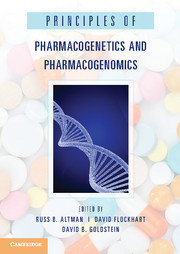Book contents
- Frontmatter
- Contents
- Contributors
- Introduction
- I Critical Concepts
- II Therapeutic Areas
- 10 Oncologic Drugs
- 11 Pharmacogenetics and Pharmacogenomics of Cardiovascular Disease
- 12 Statin-Induced Muscle Toxicity
- 13 Genomics of the Drug-Induced Long-QT Syndrome
- 14 Pharmacogenetics of Diabetes
- 15 Pharmacogenetics – Therapeutic Area – Respiratory
- 16 Pharmacogenomics Associated with Therapy for Acid-Related Disorders
- 17 Pharmacogenetics of Rheumatology: Focus on Rheumatoid Arthritis
- 18 Pharmacogenetics of Obstetric Therapeutics
- 19 Pharmacogenomics of Psychiatric Drugs
- 20 Pain and Anesthesia
- 21 HIV and Antiretroviral Therapy
- 22 Application of Pharmacogenetics and Pharmacogenomics in Pediatrics: What Makes Children Different?
- References
19 - Pharmacogenomics of Psychiatric Drugs
from II - Therapeutic Areas
Published online by Cambridge University Press: 05 June 2012
- Frontmatter
- Contents
- Contributors
- Introduction
- I Critical Concepts
- II Therapeutic Areas
- 10 Oncologic Drugs
- 11 Pharmacogenetics and Pharmacogenomics of Cardiovascular Disease
- 12 Statin-Induced Muscle Toxicity
- 13 Genomics of the Drug-Induced Long-QT Syndrome
- 14 Pharmacogenetics of Diabetes
- 15 Pharmacogenetics – Therapeutic Area – Respiratory
- 16 Pharmacogenomics Associated with Therapy for Acid-Related Disorders
- 17 Pharmacogenetics of Rheumatology: Focus on Rheumatoid Arthritis
- 18 Pharmacogenetics of Obstetric Therapeutics
- 19 Pharmacogenomics of Psychiatric Drugs
- 20 Pain and Anesthesia
- 21 HIV and Antiretroviral Therapy
- 22 Application of Pharmacogenetics and Pharmacogenomics in Pediatrics: What Makes Children Different?
- References
Summary
The primary objective of this chapter is to provide an overview of the clinical applications of psychiatric pharmacogenomic testing. Essentially, two current primary objectives of testing exist. The first is to identify medications for which a patient is at increased risk for developing side effects or adverse events. The second is to identify medications that are less likely to be effective. Ultimately, the objective of psychiatric pharmacogenomics will be to identify psychotropic medications that have a high probability of achieving a therapeutic response for an individual patient based on the identification of specific genetic variations (1).
Although clinical psychiatric pharmacogenomic testing was being provided at some academic centers before 2004, the introduction of the AmpliChip and its approval by the Food and Drug Administration in 2004 was an important milestone in the clinical adoption of genetic testing that was designed to provide guidance in the selection and dosing of psychiatric medications. Over the next 5 years, many academic medical centers introduced clinical pharmacogenomic testing of drug-metabolizing enzyme genes as a component of the clinical evaluation of patients with atypical responses to medication. As the cost of psychiatric pharmacogenomic testing decreases, there is a growing expectation that genotyping patients before initiating treatment with psychotropic medication will be a cost-effective clinical strategy to minimize adverse events.
- Type
- Chapter
- Information
- Principles of Pharmacogenetics and Pharmacogenomics , pp. 217 - 223Publisher: Cambridge University PressPrint publication year: 2012



